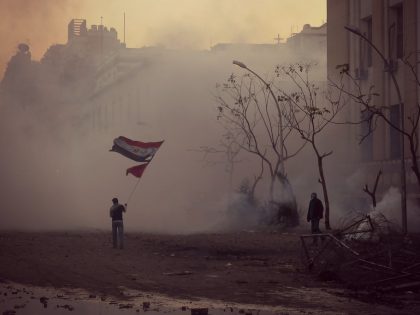Reading List: Duncan McEachern Yoon
The author’s new book wants to clear away some of the misunderstandings that dog Africa and China relations. Here, he catalogs the books that guided him.

Nan Hua Temple in Bronkhorstspruit, South Africa. Image credit Shaun Egan via Flickr CC BY-NC-ND 2.0.
Writing a book about Africa and China is a fraught proposition. Not only is the basic unit of comparison a problematic one (as the namesake of this blog has long pointed out), but also every day there are reports that make it difficult to discern whether something is misinformation via clickbait or fair-handed analysis.
Misunderstanding around this topic is so prevalent that it sometimes makes me wonder if it is intentional, especially if the outlet is linked to a geopolitical agenda. I realized early on in my writing that I would have to read across the spectrum—politically, disciplinarily, ideologically—in order to suss out the answer to what I thought was a rather straightforward question: what does China mean to African writers?
As with any academic book, the bibliography is immense. This condition is further compounded if the manuscript in question is a book about books, which is the case with my monograph, China in Twenty- and Twenty-first Century African Literature (forthcoming Cambridge UP). Yet, there are always books that grow to be fulcrums for the argument and so I will briefly give a sense of four of these below.
Even though I’m trained as a cultural critic, I knew I had to wade into the economics of the dynamic because of how controversial the headlines are around natural resource extraction and accusations of a “new colonialism.” One book that really helped me understand the macro-economics of China’s place in the global value chain was Giovanni Arrighi’s Adam Smith in Beijing (2007). Even though I did not end up citing it as extensively as I first thought, the book was in the background of my approach, especially when I examined novels that connected masculinity to resource nationalism like in, for example, Kwei Quartey’s Gold of Our Fathers (2016). Arrighi’s book also gave me a point of entry for when I engaged with studies from the social sciences such as Deborah Brautigam’s The Dragon’s Gift (2009), which focuses on the offshoring of mature industries and trade/aid deals, and C.K. Lee’s The Specter of Global China (2017), which focuses on the sociology of labor and the nature of Chinese capital.
As alluded to above, an issue that I wanted to get out in front of was the tendency to treat the African continent as homogeneous. I wanted to make sure I adequately historicized each literary text, since each chapter features at least one national context. When I was contextualizing Jean Tardif Lonkog’s The Black Man and His Visa (2013) according to Cameroonian history, I turned to Achille Mbembe’s early and untranslated monograph: La Naissance Du Maquis Dans Le Sud-Cameroun, 1920–1960 (1996). The work exemplifies thick description and helped me understand the political actors of decolonization and the Cold War in Cameroon. It also helped contextualize Lonkog’s position as an anglophone writer. I found this quality of thick description in another history of Third Worldism and the Cold War that I often turned to while writing my book: Jamie Monson’s Africa’s Freedom Railway (2009). It is a quality I will search for from now on when I am historicizing a literary text.
One of my goals with the book was to think about Édouard Glissant’s theory of creolization within the context of Africa and China relations. Using this theoretical approach to regions outside the Caribbean is not only supported by two of Glissant’s seminal works, The Poetics of Relation (1990) and the only recently translated Traité de tout-monde (1997), but also by scholars who work in the fields in which I’m interested (e.g. Françoise Lionnet in African Studies and Shu-mei Shih in Sinophone Studies). The concept from Glissant upon which I leaned most heavily was alluvium, or the alluvial. It was so important to my thinking that it even featured in the book’s initial title, Alluvial Dreams: China in African Literature. Glissant’s theory helped me think about models of cultural exchange that could not be wholly reduced to the dynamic between colonized and colonizer. One result, I hope, is that the book performs a Glissantean reading of Africa and China relations.
The last book that I will mention is Yvonne Adiambho Owuor’s The Dragonfly Sea (2019). I have to say I was a little frustrated (but in a good way) when I saw this novel appear. I had been working on several iterations of the monograph for quite some time and thought that I had rounded off my narrative quite nicely. I had already sent one version of my book to the press, but Owuor’s text was so central to my thesis that an individual’s identity can (and should) resist instrumentalization by nationalist politics that I knew I had to fit the Kenyan novel in somehow. Owuor features in my conclusion, a counterpoint to not only the penultimate chapter’s focus on multi-racial identity and the Congo in Henri Lopes’s, Le lys et le flamboyant (1997), but also to a sociological study on race and diaspora upon which I also frequently relied, Yoon Jung Park’s A Matter of Honour: Being Chinese in South Africa (2008).
All in all, I hope that I have cleared away some of the misunderstanding that dogs Africa and China relations by taking precisely the issue of cultural misunderstanding as an analytical point of departure. I also hope that the book encourages readers to explore the ambiguous spaces of this dynamic by denouncing chauvinism and jingoism while at the same time embracing complexity and nuance.



